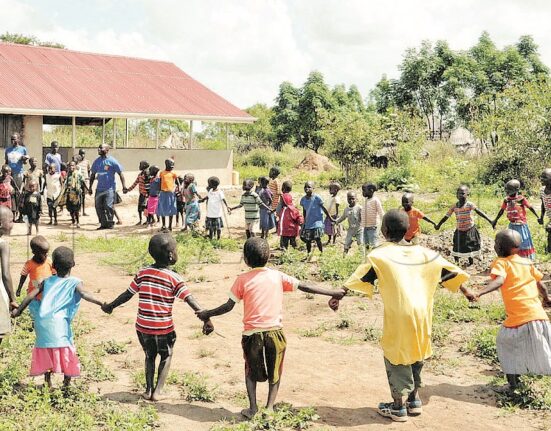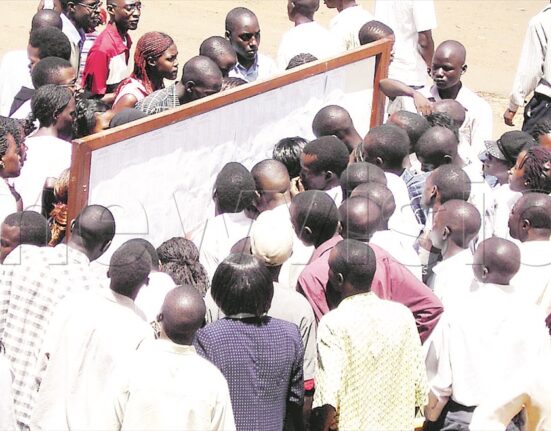(This article was first published in the New Vision on September 14, 2022)
By Robert Adiga
Delightful sounds filled the air at Arua Public Primary School on Monday morning. The children in Primary One classroom passed around a paperboard box containing pieces of cardboard, each bearing a letter, while singing the tune: ‘the box of sound games is passing around, is passing around, is passing around. The box of sound games is passing around, pick and sound it.’
Singing along with over 100 children in one of the Primary One streams, Ketty Driciru, a teacher, moved around the classroom, her eyes following the box as it went from one pupil to another.
She cocked her ears to hear the sounds children produced as they picked letters out of the box and named the sounds they represent.
Driciru teaches learners how to read and write by helping them understand the sound each letter represents. She teaches the children through songs, which she says help learners grasp her lessons and enjoy learning.
“Sounds are represented by alphabetical letters. I write lower case letters and put them in a box and pass it around,” she says.
Driciru also uses the bottle lines blend game, which involves moving around the classroom cardboard pieces bearing alphabetical letters attached to plastic bottles to help learners understand the syllables in words.
For instance, she writes syllables found in a word “man” on different cardboard pieces.
“We form words using the syllables on the bottles by forming a line with the bottles. I put emphasis on sounds because people use sounds to read rather than names of letters,” she adds. Children introduced to sounds early have no problem reading and forming sentences and spellings” she says.
Driciru explains that part of the reason why children drop out of school is the failure to read and comprehend meanings of words, but using sounds to teach helps reduce the dropout cases at it makes learning joyful.
Another technique Driciru deploys involves using agricultural seeds to help the children create letters. If she wants learners to understand letter S better, for example, she lays out the maize grains on a paper in the shape of this letter.
“This is a multisensory approach that allows children to see the letter and feel it by touch,” she says.
Leaving No One Behind
These learner-centred teaching approaches, Driciru says, enable her to help what she calls the three categories of learners — below average, average and above average – progress together.
“If you do not pay special attention to the below average category, you leave them behind. If you are not careful, the above average learners hijack the class. All children have to learn,”
Driciru, who also uses balls made from banana fibre to teach, says her teaching techniques have earned her teacher training opportunities. In July, she trained early childhood development and primary school teachers in using sounds to teach and developing learning materials. She has severally conducted similar training workshops for teachers in various refugee settlements in West Nile.
Early Grade Reading Champion
In 2013, Driciru was declared “a teaching champion” and awarded a certifi cate of excellence by the Arua municipality education department after an assessment showed that her learners were the best in literacy and numeracy across the municipality.
In the same year, the Uganda National Teachers Union rewarded her with a certifi cate of excellence after their assessment showed that her teaching methods enabled Primary One learners to read and write easily, which is not common in many public schools.
Also, in 2013, Driciru received a certifi cate from President Yoweri Museveni for her service during the Teachers’ Day celebrations at Kololo Independence Grounds in Kampala.
Since 2015, Driciru has been working with the National Curriculum Development Centre to develop and edit local languages’ teaching materials. This, she adds, has resulted in her being recognised as an early grade reading champion.
In 2018, she says she participated in a contest designed for teachers to showcase their teaching innovations during the national conference for stakeholders in education at Imperial Royale Hotel in Kampala. She beat over 50 teachers to be the overall winner.
Community Schools
When schools were closed in March 2020 to curb the spread of COVID-19, Driciru was selected by the Arua City education department to lead teachers who taught the children during the pandemic on local FM radio stations. Under the programme, which was sponsored by Save the Children, an international NGO, and the education ministry’s Strengthening Education System for Improved Learning (SESIL) intervention, Driciru was hosted on Arua One, Voice of Life and Radio Pacis.
“I still appear on radios to engage parents on education,” he says.
Driciru worked with other teachers and personalities to set up seven community-based learning centres in Abirici, Alengo, Oyoze, Ombaci, Anzu and Ariloko and Ajono-yivu cell in Arua during the lockdown under a component of the SESIL programme called Grassroots Nest for Innovations and Change.
Over 500 learners without access to radio and learning materials were taught at the centres during the lockdown. Driciru says the community learning centres now open over the weekends for learning.
“Since these centres are equipped with computers, they offer an opportunity for learners to acquire ICT skills,” she adds.
Returning To School
Driciru, who heads the education department in Arua Youth Development Initiative, a local organisation, says she used her position to mobilise children through radios to return to school when the lockdown was lifted.
Driciru also attended the Parents-Teachers Association meetings at various schools, such as Ombaci Primary School, urging parents to ensure that their children return to school. She also facilitated sessions during workshops designed to help teachers readjust to the school environment and teaching.
“I started my lessons with words of counsel to learners, urging them to remain in school,” she says.
Golden Tips
- Be organized
- Work hard and do everything well
- Prepare your child for success
- Children belong to the community
- It is our responsibility to raise responsible people
- Teaching is a noble job
Fact file
- 1996: Sat PLE at Opia Primary School
- 2000: Did UACE at Vurra Secondary School
- 2003: Graduated as grade III teacher from Arua Core PTC
- 2003: Started teaching at Arua Hill Primary School
- 2004: Teacher at Onzivu Primary School
- 2009 to date: Teacher at Arua Public Primary School
- 2010: Graduated as grade IV teacher at Muni National Teachers’ College
- 2020: Graduated with a bachelor’s degree in early childhood Development from Busitema University








Leave feedback about this